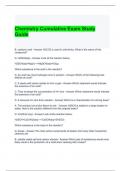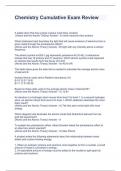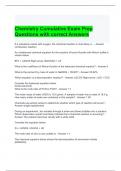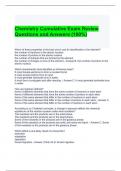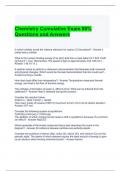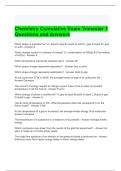Chemistry cumulative exam - Study guides, Class notes & Summaries
Looking for the best study guides, study notes and summaries about Chemistry cumulative exam? On this page you'll find 186 study documents about Chemistry cumulative exam.
Page 2 out of 186 results
Sort by
Chemistry Cumulative Exam Study Guide
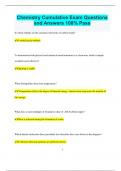
-
Chemistry Cumulative Exam Questions and Answers 100% Pass
- Exam (elaborations) • 10 pages • 2024
-
Available in package deal
-
- $9.99
- + learn more
Chemistry Cumulative Exam Questions and Answers 100% Pass In which orbitals are the outermost electrons of carbon found? s orbital and p orbitals To demonstrate both physical and chemical transformations in a classroom, which example would be most effective? Igniting a candle What distinguishes heat from temperature? Temperature reflects the degree of thermal energy, whereas heat represents the transfer of this energy. What does a water enthalpy of formation value of -285...
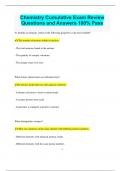
-
Chemistry Cumulative Exam Review Questions and Answers 100% Pass
- Exam (elaborations) • 10 pages • 2024
-
Available in package deal
-
- $9.99
- + learn more
Chemistry Cumulative Exam Review Questions and Answers 100% Pass To identify an element, which of the following properties is the most reliable? The number of protons within its nucleus. - The total neutrons found in the nucleus - The quantity of isotopic variations - The charge count of its ions What feature characterizes an Arrhenius base? It releases hydroxide ions into aqueous solutions. - It donates electrons to form covalent bonds - It accepts protons from acids - It gener...
Chemistry Cumulative Exam Review
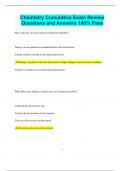
-
Chemistry Cumulative Exam Review Questions and Answers 100% Pass
- Exam (elaborations) • 8 pages • 2024
-
Available in package deal
-
- $9.99
- + learn more
Chemistry Cumulative Exam Review Questions and Answers 100% Pass How is the law of conservation of energy best defined? Energy can be produced or annihilated but will switch forms. Energy remains constant in all chemical processes. Energy is neither created nor destroyed; it simply changes from one form to another. Energy is wasted in most chemical transformations. What effect does adding a catalyst have on a chemical reaction? It decelerates the reaction rate. It alters the end...
Chemistry Cumulative Exam Prep Questions with correct Answers
Chemistry Cumulative Exam Review Questions and Answers (100%)
Chemistry Cumulative Exam 90% Questions and Answers
Chemistry Cumulative Exam Trimester 1 Questions and Answers
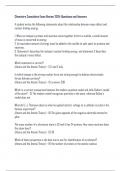
-
Chemistry Cumulative Exam Review 2024 Questions and Answers
- Exam (elaborations) • 22 pages • 2024
-
- $21.39
- + learn more
Chemistry Cumulative Exam Review 2024 Questions and Answers A student writes the following statements about the relationship between mass defect and nuclear binding energy. 1. When an isotope's protons and neutrons come together to form a nuclide, a small amount of mass is converted to energy. 2. An equivalent amount of energy must be added to the nuclide to split apart its protons and neutrons. 3. Statement 1 describes the isotope's nuclear binding energy, and statement 2 describe...

That summary you just bought made someone very happy. Also get paid weekly? Sell your study resources on Stuvia! Discover all about earning on Stuvia

